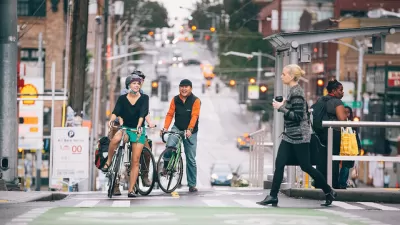As it winds down port operations in the area, Bergen plans to transform its Dokken district from a busy shipping hub to a car-free, 'regenerative' zone.

A coastal district of the Norwegian city of Bergen is preparing to become a zero-emissions neighborhood. As Adele Peters writes, "[t]he project is still in the planning stages, as the city runs workshops to involve residents in the creation of the neighborhood. But a new proposal illustrates what the area, which will include affordable housing, businesses, and other services, might look like."
With much of the land in the area owned by the city, Bergen leaders see this as "the opportunity of the century," a chance "to set high goals for what we want city development to be," says Laura Ve, who leads the development program for the Dokken district. The goal is to create a car-free zone "filled with people on foot and bikes" where "[e]verything is easily accessible based on low-impact mobility" and residents can easily connect to light rail and ferries.
"The design aims to create a 'regenerative' city, not just a sustainable one." The city plans to add new green space to "reconnect the public to the North Sea, with nature-based strategies used to protect the area from flooding caused by heavy storms, heat waves, and sea-level rise." While it's impossible to completely eliminate environmental impacts, the project aims to "find alternatives to fossil fuels in production, capture emissions, and even incorporate emissions into the finished product" for construction materials and "carefully calculate the full life cycle impacts of each decision."
Flemming Rafn, a founding partner at Tredje Natur, the Copenhagen-based architecture firm that worked on the project with designers at Entasis, Matter by Brix, and MOE, says, in addition to reducing carbon emissions, "the new neighborhood can demonstrate how tackling environmental challenges can also improve the local quality of life."
FULL STORY: How to redesign a neighborhood for zero emissions

Alabama: Trump Terminates Settlements for Black Communities Harmed By Raw Sewage
Trump deemed the landmark civil rights agreement “illegal DEI and environmental justice policy.”

Study: Maui’s Plan to Convert Vacation Rentals to Long-Term Housing Could Cause Nearly $1 Billion Economic Loss
The plan would reduce visitor accommodation by 25% resulting in 1,900 jobs lost.

Planetizen Federal Action Tracker
A weekly monitor of how Trump’s orders and actions are impacting planners and planning in America.

Wind Energy on the Rise Despite Federal Policy Reversal
The Trump administration is revoking federal support for renewable energy, but demand for new projects continues unabated.

Passengers Flock to Caltrain After Electrification
The new electric trains are running faster and more reliably, leading to strong ridership growth on the Bay Area rail system.

Texas Churches Rally Behind ‘Yes in God’s Back Yard’ Legislation
Religious leaders want the state to reduce zoning regulations to streamline leasing church-owned land to housing developers.
Urban Design for Planners 1: Software Tools
This six-course series explores essential urban design concepts using open source software and equips planners with the tools they need to participate fully in the urban design process.
Planning for Universal Design
Learn the tools for implementing Universal Design in planning regulations.
Caltrans
Smith Gee Studio
Institute for Housing and Urban Development Studies (IHS)
City of Grandview
Harvard GSD Executive Education
Toledo-Lucas County Plan Commissions
Salt Lake City
NYU Wagner Graduate School of Public Service





























